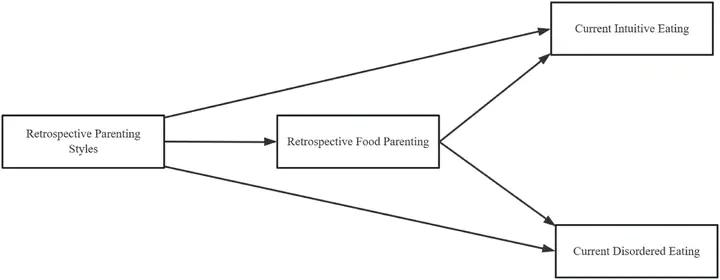Associations among retrospective parenting styles, retrospective food parenting, and current eating behaviors in Chinese adults

The current study explored the relationships between retrospective parenting styles and food parenting in childhood (≤ 12 years old) and Chinese adults’ current maladaptive and adaptive eating behaviors. We recruited 501 Chinese adults (50.30% men, aged 19–46 years). A set of questionnaires were used to measure retrospective parenting styles (i.e., emotional warmth, rejection, and overprotection), food parenting (i.e., parental concern, monitoring, pressure to eat, and restriction), and current maladaptive (i.e., disordered eating) and adaptive (i.e., intuitive eating) eating behaviors. Correlation and mediation analyses were employed to analyze these data. Results revealed that retrospective parenting styles and food parenting were significantly related to current maladaptive and adaptive eating behaviors in both Chinese men and women. Mediation analyses showed that higher retrospective parental warmth was related to higher retrospective parental concern which, in turn, was related to higher current disordered eating in men (indirect effect = 0.14, 95% CI 0.08, 0.24). Furthermore, higher retrospective parental overprotection was related to higher retrospective parental pressure to eat which, in turn, was related to higher current disordered eating in men (indirect effect = 0.06, 95% CI 0.01, 0.14). For women, higher retrospective parental warmth was associated with higher retrospective parental concern which, in turn, was associated with lower current intuitive eating in women (indirect effect = −0.04, 95% CI = −0.10, −0.01). Furthermore, higher retrospective parental overprotection was associated with higher retrospective parental concern which, in turn, was associated with lower current intuitive eating in women (indirect effect = −0.03, 95% CI = −0.08, −0.004). The findings indicate the importance of including childhood parenting styles and food parenting in future research and intervention of adults’ current maladaptive and adaptive eating behaviors.